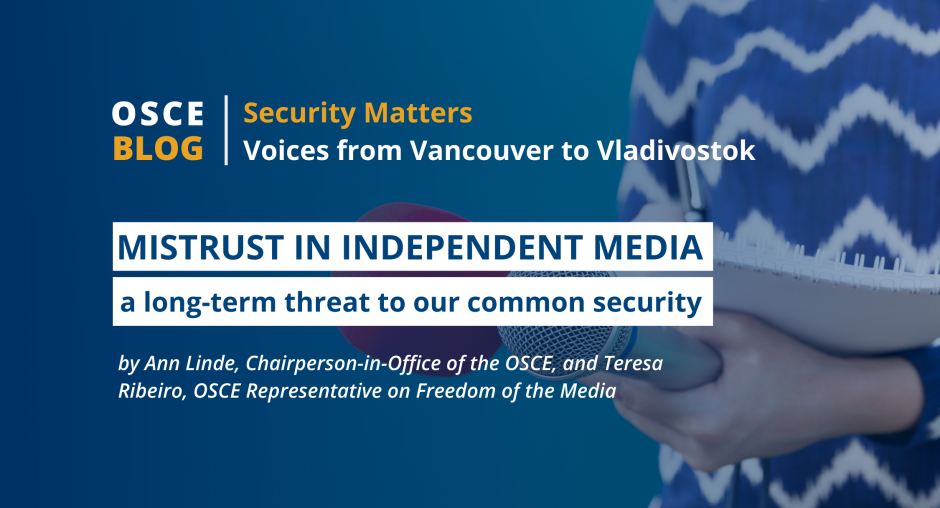Mistrust in independent media poses a long-term threat to our common security
Being a journalist unfortunately is becoming an ever more dangerous profession. The recently published 2021 World Press Freedom Index compiled by Reporters Without Borders paints a dark picture in this regard. It shows that journalism is blocked and hindered in 73 of the 180 countries ranked by the organization. This trend is unfortunately also visible in countries in the OSCE region.
Female journalists are especially targeted. In a recent study by UNESCO, 73 per cent of women journalists who responded had experienced online violence in the course of their work. One in five reported being attacked offline in connection with online violence they had experienced. The offline and online attacks — often resulting in impunity — not only put their safety at risk, but also risks discrediting them and creates mistrust in their important work.
The deterioration of media freedom in our region stems from a range of negative developments that include legislative restrictions, lack of independence, as well as threats and violence against journalists. A very concerning trend that we have witnessed in recent time, and that worries us gravely, is a growing mistrust towards journalists and increasing anti-media sentiment. Albeit not new, the current pandemic has exacerbated this challenge. Restrictive measures and attempts to discredit and prevent scrutiny imposed by several State actors and other public figures against independent media contributes to further erode trust in the media.
Discrediting of, and sowing distrust against, journalists and other media workers is unacceptable. It poses a serious threat to democracy and to our common security.
To safeguard our societies today and tomorrow, sustainable solutions are needed. Therefore, we have invited representatives of the OSCE participating States as well as journalists, media actors and experts, to come together during a Stockholm-based conference to find ways forward to deal with this pressing issue. At the meeting, best practices from across the OSCE region will be showcased to inspire others on how to address this serious situation.
We will put a special emphasis on the dire challenges faced by female journalists and media actors, as we have been doing with our #SOFJO-project for the last six years. Many brave female journalists have already shared their experiences with us and, by doing so, enriched initiatives and new strategies that can make a difference for so many journalists’ daily life and work — both women and men.
However, attacks and threats against journalists is an issue that must be properly dealt with. As the ones that are first and foremost responsible for the safeguarding of human rights, we will mainly focus on the role of governments at our upcoming conference. By respecting and implementing international obligations and joint commitments, and by enabling a pluralistic and independent media landscape, all 57 OSCE participating States can contribute to increased public trust in independent media.
OSCE participating States, for many years, and repeatedly, have agreed on a concept of comprehensive security. This means that we recognize human rights, democracy and the rule of law as an indispensable foundation for stable and secure societies in our region. This expressively includes free expression and freedom of the media — journalists must be able to report without facing danger.
This is a matter of urgency. Let’s step up our efforts in strengthening the trust in independent media today, across our region. It is our common security we need to defend.

